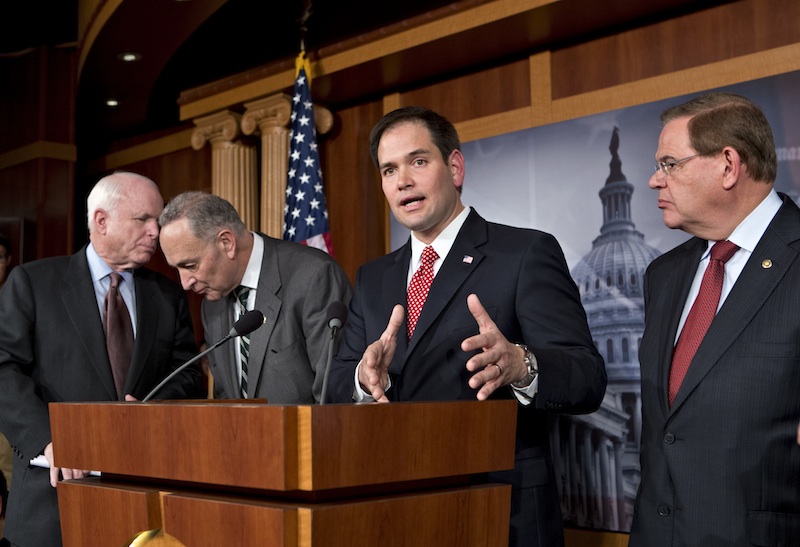For the past several months, Sen. Marco Rubio (R-FL) walked a fine line on comprehensive immigration reform: simultaneously working to craft legislation that includes a pathway to citizenship while bending over backward to assuage and sometimes play to the concerns of his conservative colleagues and supporters.
But on Sunday, as he and seven of his Republican and Democratic colleagues prepare to release a comprehensive immigration reform bill early this week, Rubio sang a different tune. The potential 2016 presidential contender took center stage with appearances on seven talk shows — including on two Spanish media outlets — kicking off a serious effort to win over skeptical Republicans and pass reform.
In making his pitch to fellow Republicans, Rubio continued to share their concerns about the bill. Rubio acknowledged, for instance, the concern of Republican Sen. Mike Lee of Utah, who has argued that reform should come in small steps rather than one comprehensive bill. “That’s my preference too, is to have done that in individual bills,” Rubio said on CNN’s “State of the Union”. “That’s not the direction the Senate was headed. So I made a decision to try to influence the direction we were headed.”
But Rubio also took on his critics objections and offered his own counter arguments.
To Sen. Lee’s preference for a piecemeal approach, Rubio argued that the comprehensive bill is divided into segments and that each segment is being treated independently. “Through our negotiations, we’ve been able to keep these segments separate from each other,” he said. “In essence, we haven’t had to trade less border security in exchange for a modernized system… As long as the product stays that way, it will be defensible.”
On contentious pathway to citizenship question, Rubio vigorously argued against the accusation that the Gang of Eight’s plan amounts to amnesty. “I would argue to you that it will be cheaper, faster and easier for people to go back home and wait 10 years than it will be to go through this process I’ve outlined,” Rubio said on “Fox News Sunday.” “That’s why it’s not amnesty.”
He also took on a critique from the conservative Heritage Foundation — now run by former Sen. Jim DeMint (R-SC) — that the bill will be an economic drag.
“Conservatives love dynamic scoring, which [is] a complicated way of saying you look at a budget issue not just for the costs but for the benefits associated with it, ” Rubio said on Fox, citing tax cuts as an example of where Republicans use dynamic scoring. “All I’m asking for is that for this plan to be reviewed through that standard – the same conservative dynamic scoring that we apply to tax cuts. Because I am confident that if you do that – and some have already started doing that – you will find that when we reform our legal immigration system, we get these people that are already here now paying their taxes and not taking anything out of the system, this will be a net positive for the country economically now and in the future.”
Convincing his colleagues to get on board with the bill, Rubio openly admitted, is his mission. As long as the amendment process does not alter the bill too much in a direction he opposes, Rubio said, he plans to defend every piece of the bill.
“I think part of my job is to explain to people what it is we’ve worked on, try to justify it and hopefully gain their support,” Rubio said on CNN. “There are people that have ideas out there now that used to be my original position on some of these issues — and I’m talking about very hyper-technical issues — and I’ll be able to tell them the thought process I went through that led them to the point that we’re at right now. And I think I’ll be able to justify, you know, virtually every single aspect of this bill.”
“I hope I can convince people that this is the right approach,” he said.






